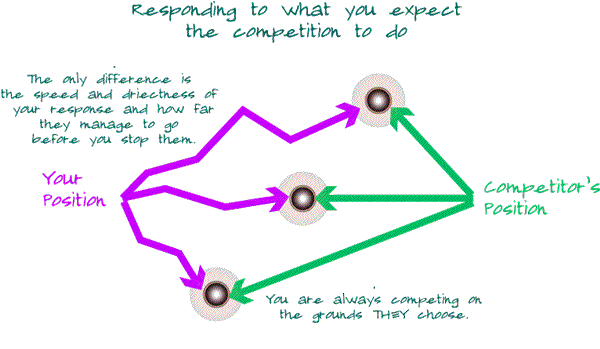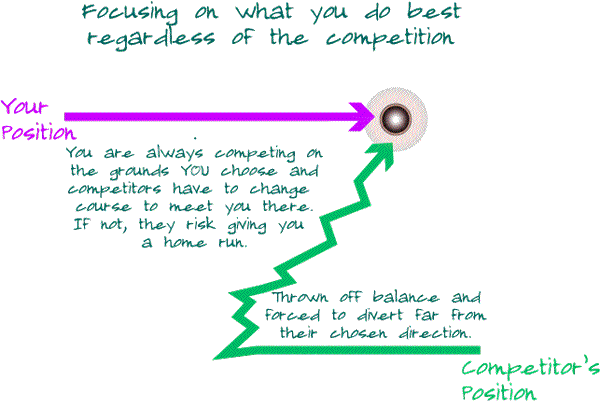Slow Down and Play to Your Strengths

One of the commonest mistakes leaders make is to focus on countering what they believe the competition will do. This hands the initiative to competitors and ensures that nearly all activities will be reactive. As a way of managing an organization it looks efficient—people are running in every direction to ward off competitive incursions into market share or customer loyalty—but, in reality, most of the busyness comes from trying frantically to catch up with changes that were only partially anticipated, if at all. A far better way is to slow down and take time to work out what truly needs to be done, shifting your focus away from what competitors and the marketplace might do, and on to deciding instead what you can do next to improve your business.
Trying to second guess the opposition is a mug’s game. You are unlikely to get it right, so most time and effort goes into reacting to events or catching up. Meanwhile, your competitors are setting the rules of the game, probably in ways that put you at a disadvantage. In place of capitalizing on your business strengths, you are forced to try to react to theirs.
Apple computers has been a perfect example of doing what they could do to build business, not trying to chase after the competition, which has long been overwhelming enough in terms of market share to make Apple seem a hopeless investment. Apple didn’t try to compete on price, nor on special offers or discounts. By focusing entirely on what it does best—producing revolutionary products based on outstanding design and innovation—and more or less ignoring the competition’s desired grounds for a contest, they have survived and prospered.

When you focus on what you can do best, you force your competitors to react to you: to play the contest on ground of your choosing, not theirs. By thinking farther ahead, you take them off balance, since the most likely area for their focus will be the short-term. You spot the coming trend and are ready. They miss it (they weren’t looking far enough ahead) and now have to react to you, with insufficient time to think properly or plan a response.
The victory does not always go to the big battalions. History is full of instances where a smaller, more cunning and less predictable adversary has completely overthrown some huge, lumbering force intent on dealing with what its leaders assumed their opponent would do.
The keys to managing in this way are courage (to stand your ground and refuse to be drawn onto theirs), focus (to give your people the time they need and ignore temptations to divert to deal with short-term pressures), patience (to take the long-term view and wait for the right moment to spring your surprises), and thoughtfulness (to avoid what may seem to be quick-fix answers and obvious responses, in favor of staying with your true strengths and goals). The best leaders are not always the obvious types, full of lust for action. Often quiet, thoughtful, and reflective leaders have surprised everyone by winning with much less effort and far more flair.







0 Comments:
Post a Comment
<< Home